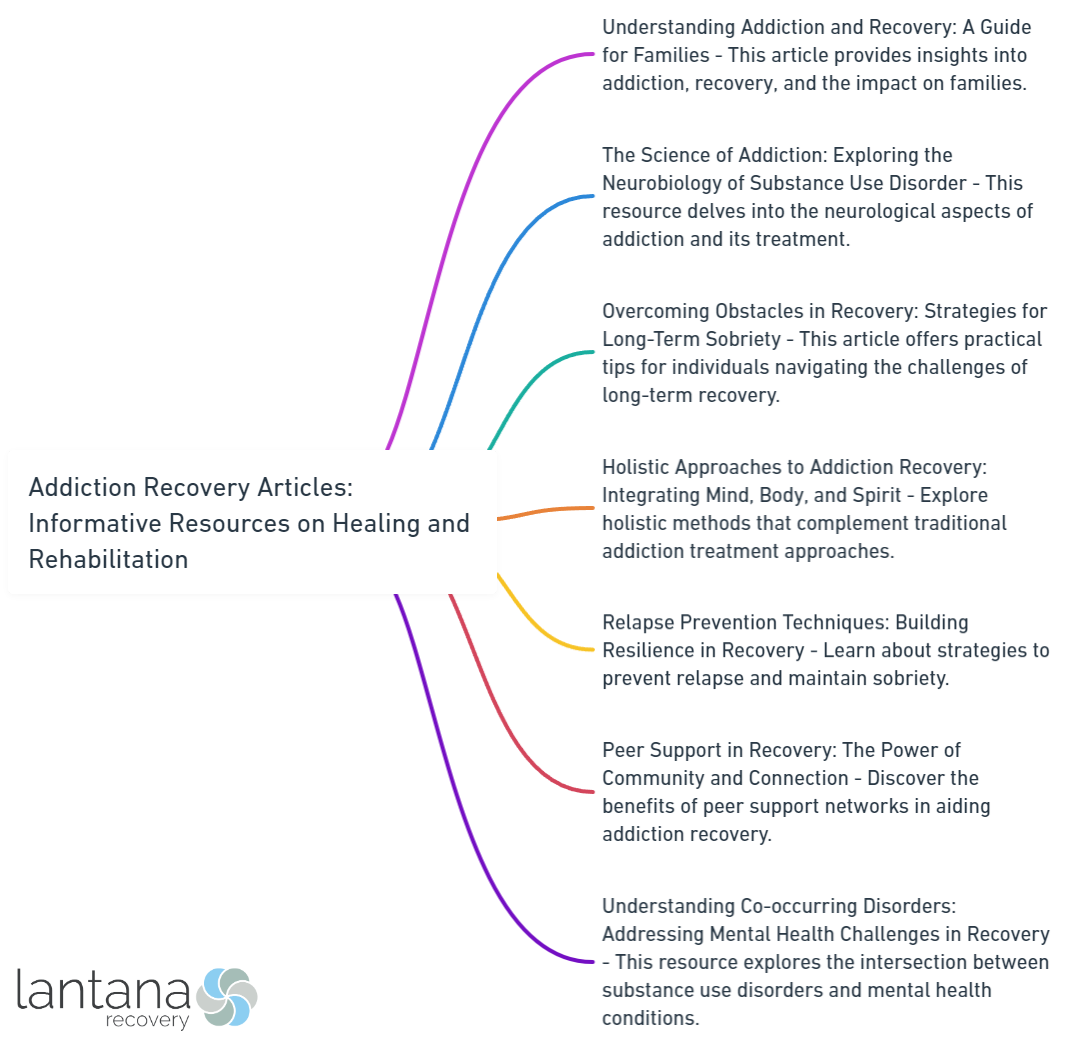Addiction recovery is a complex and challenging journey, but with the right resources and support, it is possible to heal and rehabilitate. Understanding addiction and the process of recovery is crucial in providing individuals with the knowledge and tools they need to overcome substance abuse. This collection of addiction recovery articles serves as an informative resource, offering valuable insights and guidance on various aspects of healing and rehabilitation.
Firstly, it is important to grasp the concept of addiction itself. What is addiction? Understanding the nature of addiction, its causes, and its effects on individuals and their loved ones is essential in addressing this pervasive issue. Exploring why addiction recovery is important sheds light on the profound impact it can have on an individual’s physical and mental well-being, relationships, and overall quality of life.
The process of addiction recovery consists of various stages, each playing a vital role in the journey toward sobriety. Understanding these stages, from acknowledging the problem to maintaining long-term recovery, provides individuals with a roadmap for their personal healing process. Detoxification, a crucial step in recovery, helps individuals safely withdraw from substances and manage withdrawal symptoms. Different types of addiction treatment programs, such as inpatient rehabilitation, outpatient therapy, and holistic approaches, offer diverse strategies and approaches tailored to individual needs.
Within the realm of addiction recovery, there are numerous articles that provide insight into specific healing and rehabilitation techniques. Individual therapy can be a powerful tool for addressing underlying issues and building coping skills. Group support, such as 12-step programs, provides a sense of community and encouragement throughout the recovery journey. Alternative therapies, like art therapy or mindfulness practices, offer innovative approaches to healing. Learning healthy coping mechanisms is essential to prevent relapse and foster a sustainable recovery for addiction recovery is just one way of educating oneself. Maintaining physical health through nutrition and exercise can significantly support the healing process.
Lastly, accessing resources for addiction recovery is crucial for long-term success. Support groups and 12-step programs offer a network of individuals who can relate to similar struggles and provide guidance and support. Rehabilitation centers and treatment facilities provide comprehensive care, addressing both the physical and psychological aspects of addiction. Online resources, books, and literature offer easily accessible information and guidance to individuals in need. Professional services, including therapists, counselors, and medical professionals, play a critical role in supporting individuals throughout their recovery journey.
By delving into these addiction recovery articles, individuals can gain valuable insights, practical tips, and a sense of empowerment as they work toward healing and rehabilitation.

What is Addiction?
Addiction is a chronic disease that affects the brain and behavior. It is characterized by compulsive drug seeking and use, despite harmful consequences. It results from repeated substance use, causing changes in the brain’s reward circuitry.
Key aspects of addiction include tolerance and withdrawal symptoms. Tolerance occurs when higher amounts of a drug are needed for the desired effect, while withdrawal symptoms occur when the drug is stopped abruptly. These factors contribute to the cycle of dependence and cravings for addiction.
Effective treatment and recovery for addiction require a comprehensive and individualized approach that addresses the physical, psychological, and social aspects of the disease. It is important to understand addiction and its impact on the individual. Addiction is not a moral failing, but a disease that requires support and compassion. By raising awareness and providing evidence-based treatment, we can help individuals overcome addiction and achieve fulfilling lives in recovery.
Why is Addiction Recovery Important?
Addiction recovery is important for several reasons:
- It helps individuals restore their physical and mental well-being. Through therapy and support, recovery addresses mental health issues and eliminates harmful substances to improve physical health.
- Recovery provides an opportunity to rebuild relationships. By demonstrating a commitment to change, individuals can mend connections, rebuild trust, and foster healthier relationships.
- Recovery enhances the overall quality of life. It improves various aspects such as career, finances, and personal fulfillment. It enables individuals to regain control, pursue their goals, and improve their overall well-being.
- Recovery equips individuals with tools and strategies to prevent relapse. By cultivating healthy coping mechanisms and building a strong support network, individuals can better handle triggers and cravings and prevent a return to addiction.
- Personal recovery journeys can inspire others who are struggling with addiction. By sharing their stories, learning about different SMART goal examples and showcasing successful recovery, individuals offer hope and encouragement to those facing similar challenges.

Understanding the Process of Addiction Recovery
Addiction recovery is a complex and deeply personal journey. In this section, we’ll unravel the intricacies of the process and shed light on the stages one encounters along the way. We’ll also explore the transformative role of detoxification in recovery and introduce different types of addiction treatment programs. So, buckle up and join us as we dive into the fascinating world of addiction recovery, providing you with valuable insights and resources to aid your own healing and rehabilitation.
Stages of Addiction Recovery
- Recognition: Recognizing the problem is the first stage of addiction recovery. This involves acknowledging the negative consequences of addiction and making your way to acceptance in addiction recovery where you can embrace change and growth.
- Commitment: After recognition, the individual must commit to making a change and taking the necessary steps toward recovery. This may involve seeking help, setting goals, and making a plan.
- Detoxification: Detoxification is important in addiction recovery, especially for individuals with substance addictions. It involves removing the addictive substance from the body and managing withdrawal symptoms.
- Therapy and Counseling: Therapy plays a crucial role in helping individuals address the underlying causes of their addiction and develop coping mechanisms. Individual therapy, group therapy, and family therapy are common approaches used in this stage.
- Support and Maintenance: This stage involves establishing a support system to help individuals maintain their recovery. This may include participation in support groups like Alcoholics Anonymous or Narcotics Anonymous, as well as ongoing counseling and therapy.
Throughout the stages of addiction recovery, it is important for individuals to stay committed, seek professional help from Lantana when needed, and actively engage in their recovery process. Recovery is a journey, and progress may vary from person to person. It is crucial to remember that relapse is a possibility, but it does not mean failure. With continued effort and support, individuals can achieve long-term recovery and lead fulfilling lives free from addiction.
The Role of Detoxification in Recovery
Detoxification plays a crucial role in the recovery process from addiction. It is a supervised procedure that assists individuals in managing withdrawal symptoms and eliminating toxins from their bodies. Here are some key points to understand about the role of detoxification in recovery:
1. Detoxification as the first step: In addiction treatment, detoxification serves as the initial phase. Its main focus is to stabilize individuals both physically and emotionally, preparing them for long-term recovery.
2. Managing withdrawal symptoms: Detoxification provides medical support to help individuals cope with uncomfortable and potentially dangerous withdrawal symptoms that may arise when substances are abruptly discontinued. These symptoms can range from physical issues like nausea, tremors, and seizures to psychological challenges such as anxiety and depression.
3. Importance of medical supervision: It is crucial for detoxification to be carried out under the supervision of medical professionals. This ensures the safety and well-being of the individual undergoing detoxification. Moreover, this allows for personalized care and appropriate management of any complications or emergencies that may arise.
4. Transition to the next phase of treatment: Detoxification alone is not sufficient for long-term recovery. It should be followed by ongoing addiction treatment, which may include therapy, counseling, and support groups. Detoxification serves as a fundamental stage for further treatment, helping individuals prepare for the obstacles that lie ahead.
By emphasizing the role of detoxification in recovery, individuals can gain a better understanding of its significance and make informed decisions regarding their addiction treatment journey. Seeking professional help and guidance from modern treatment providers during this process is vital for sustainable recovery.
Remember, recovery is a journey that requires continuous commitment and support. Do not hesitate to reach out to healthcare professionals or addiction specialists to explore the available options for yourself or your loved ones.
Types of Addiction Treatment Programs
- Residential Treatment Programs: These programs provide structured and supportive environments for individuals to live in while receiving intensive addiction treatment. They offer therapies, such as individual counseling, group therapy, medical detoxification, and aftercare planning.
- Outpatient Treatment Programs: Unlike residential programs, outpatient programs allow individuals to live at home while attending therapy sessions. They are flexible, often offering evening or weekend sessions to accommodate work or family responsibilities.
- Intensive Outpatient Programs (IOPs): IOPs offer a higher level of care than standard outpatient programs. They involve more frequent therapy sessions and may include additional services such as medication management. IOPs are suitable for individuals with moderate to severe addiction who require more structured support.
- Partial Hospitalization Programs (PHPs): PHPs provide a higher level of care than both outpatient and IOPs. Individuals attend treatment sessions during the day and return home in the evenings. These programs are ideal for individuals who need intensive therapy but do not require 24-hour supervision.
- Dual Diagnosis Programs: Dual diagnosis programs are designed for individuals with both a substance use disorder and a co-occurring mental health disorder. These programs provide integrated treatment, addressing both conditions simultaneously.
By considering the different types of addiction treatment programs available, individuals can choose the one that best suits their needs and circumstances. It’s essential to consult with healthcare professionals or addiction specialists who can assess the individual’s condition and recommend the most appropriate program for their recovery journey. Treatment may need to be tailored to address specific concerns and goals, ensuring a comprehensive and personalized approach to addiction recovery.
Articles on Healing and Rehabilitation
Embark on a journey through the world of healing and rehabilitation as we delve into a series of captivating articles. Discover the benefits of individual therapy, the power of group support, alternative therapies, healthy coping mechanisms, and the role of nutrition and exercise in addiction recovery. Uncover a wealth of insights and practical tips that can transform your journey to a healthier, more fulfilling life. Get ready to explore the vast landscape of healing and rehabilitation in this enlightening collection of articles.
The Benefits of Individual Therapy for Addiction Recovery
Individual therapy is an essential component of addiction recovery, offering a wide range of benefits that greatly contribute to the healing process. The personalized approach of individual therapy ensures that treatment is specifically tailored to meet the unique needs of each individual. This means that therapy can focus on addressing the distinct challenges and underlying issues faced by those in recovery from addiction.
- Confidentiality and trust are key aspects of individual therapy, as it creates a safe and judgment-free space for individuals to openly share their thoughts, feelings, and experiences. This environment builds trust between the therapist and the individual, allowing for a deeper exploration of the root causes of addiction.
- Emotional support is a vital aspect of individual therapy, providing assistance to individuals in processing their emotions related to addiction and recovery. Techniques such as cognitive-behavioral therapy (CBT) and motivational interviewing can help clients develop healthy coping mechanisms and acquire essential stress management skills.
- Identifying triggers and developing personalized coping strategies are crucial components of individual therapy. Therapists can identify triggers that are specific to each individual’s addiction and work with them to create personalized coping strategies, ultimately aiding in the prevention of relapse. By understanding their unique triggers and vulnerabilities, individuals can learn effective techniques to manage cravings and avoid potential obstacles.
- Individual therapy also plays a key role in building self-awareness and self-esteem. By delving into underlying issues and developing healthier thought patterns, individuals can gain a deeper understanding of themselves, their behavioral patterns, and their choices. This process cultivates self-esteem and contributes to overall well-being.
- Incorporating individual therapy into an addiction recovery plan provides a personalized approach, emotional support, and practical strategies. Seeking professional help is a crucial step towards overcoming addiction and reclaiming a healthier, more fulfilling life.
The Importance of Group Support in the Healing Process
Group support is vital in the healing process, as it offers emotional support, shared experiences, peer accountability, learning opportunities, and social connection. This support network is crucial for individuals in addiction recovery. By participating actively in group support, individuals can enhance their well-being and cultivate a sense of community.
- It provides a safe space for expressing emotions, gaining empathy, and validation. In addition, group support allows individuals to connect with others who have faced similar challenges, promoting inspiration and a sense of belonging. It also fosters peer accountability, encouraging individuals to stay committed to their recovery goals.
- Furthermore, group support provides learning opportunities through discussions and sharing of coping strategies and relapse prevention techniques. Moreover, it helps individuals rebuild social connections and develop new, healthy relationships, countering the isolation caused by addiction.
It is important to consider personal preferences when choosing a support group, finding one that aligns with individual values and needs. Options such as 12-step programs, SMART Recovery, and Celebrate Recovery are popular choices. Seeking professional guidance and counseling services can also provide additional support. Choose the best fit and embark on a healing journey surrounded by the support and understanding of a group.
Alternative Therapies for Addiction Recovery
“Addiction treatment services research assumes that people with substance use disorders have a range of problems, degrees of severity, resources, and strengths” (Evidence-based practices for substance use disorders, McGovern & Carrol, 2013.) Alternative therapies for addiction recovery can play a crucial role in supporting individuals in their healing and rehabilitation journey. These therapies provide additional tools and approaches that can aid in the recovery process. Here are some alternative therapies that have proven to be helpful:
1. Acupuncture: This traditional Chinese medicine practice involves the insertion of thin needles into specific points on the body. Acupuncture not only helps reduce cravings and relieve withdrawal symptoms but also promotes a sense of relaxation and overall well-being.
2. Art therapy: Expressive art therapies, such as painting or sculpting, offer individuals an opportunity to explore their emotions, improve self-esteem, and develop healthier coping mechanisms. Engaging in creative activities not only provides a sense of purpose but also a feeling of accomplishment.
3. Mindfulness meditation: By focusing on the present moment, mindfulness meditation cultivates awareness and acceptance without judgment. This practice has been found to reduce stress, enhance self-awareness, and decrease cravings and relapse rates.
4. Yoga: Combining physical postures, breathing exercises, and meditation, yoga helps regulate the nervous system, reduce anxiety and depression, and improve overall well-being. It also fosters a connection between the body and mind and supports the adoption of healthier lifestyles.
5. Equine therapy: Interacting with horses can be a transformative experience, as it helps individuals develop communication skills, self-confidence, trust, and empathy. Working with horses symbolizes overcoming challenges and building healthy relationships.
Incorporating these diverse therapies into addiction recovery programs allows individuals to access a broad range of tools and resources that address their unique needs. It is important to consult with healthcare professionals and addiction specialists to determine which therapies would be most beneficial for specific circumstances. By integrating alternative therapies, holistic healing becomes more attainable for those on the path to recovery.
Healthy Coping Mechanisms to Prevent Relapse
To prevent relapse in addiction recovery, it is important to incorporate healthy coping mechanisms. These strategies are essential in managing triggers and cravings, effectively reducing the risk of returning to addictive behaviors. Here are several examples of healthy coping mechanisms that should be considered:
1. Engaging in regular exercise: Physical activity not only contributes to overall well-being but also helps to alleviate stress. It is recommended to aim for at least 30 minutes of exercise on most days of the week.
2. Practicing mindfulness and meditation: These techniques can greatly enhance emotional well-being and promote self-awareness. By utilizing these practices, individuals can effectively manage cravings and negative emotions.
3. Seeking support from a support system: It is crucial to surround oneself with positive influences and trusted individuals who truly understand the recovery journey. Their support and encouragement can be invaluable.
4. Developing healthy hobbies and interests: Engaging in activities that bring joy and fulfillment is a great way to distract oneself from cravings. Additionally, these hobbies provide a sense of purpose and accomplishment.
5. Practicing stress management techniques: Exploring techniques such as deep breathing exercises, listening to calming music, or practicing yoga can promote a sense of calm and reduce the reliance on substances for relief.
6. Establishing a routine: Creating a structured daily routine provides stability and minimizes opportunities for relapse.
7. Attending therapy or counseling sessions: Individual therapy from experts like those at Lantana Recovery in Greenville or counseling is highly beneficial in addressing underlying issues and developing healthy coping skills for managing triggers and cravings.
8. Staying connected to a recovery community: Participating in support groups or 12-step programs provides guidance, accountability, and a sense of community among individuals who are facing similar challenges.
9. Setting realistic goals: Setting achievable goals is a great way to boost motivation and self-esteem, ultimately providing a sense of progress in the recovery journey.
10. Practicing self-care: Prioritizing physical, emotional, and mental well-being is of utmost importance. Engaging in activities such as getting enough sleep, consuming nutritious meals, and practicing self-compassion are crucial components of self-care.
By incorporating these healthy coping mechanisms, individuals can greatly enhance their chances of maintaining their recovery and living a fulfilling and addiction-free life.
The Role of Nutrition and Exercise in Recovery
Nutrition and exercise play a vital role in the recovery process from addiction. It is crucial to maintain a balanced diet and engage in regular physical activity as they greatly enhance both physical and mental well-being, boost mood, and improve overall recovery proficiency.
1. Nutrition: Adequate intake of essential nutrients through a balanced diet is essential for recovery. Vitamins, minerals, and proteins support the body’s healing process and repair damage caused by substance abuse. Incorporating fruits, vegetables, whole grains, lean proteins, and healthy fats into meals provides the necessary nutrients for recovery. To improve brain function and reduce inflammation, it is beneficial to include foods high in omega-3 fatty acids such as salmon or walnuts.
2. Exercise: Engaging in regular physical activity has numerous benefits for recovery. Exercise improves physical health and helps to reduce stress, anxiety, and depression. It stimulates the release of endorphins, which enhance mood and promote overall well-being. Activities such as walking, jogging, swimming, or yoga can benefit both physical and mental health.
3. Hydration: Maintaining proper hydration is crucial for everyone, especially those in recovery. Drinking plenty of water helps to flush out toxins, aids digestion, and supports overall bodily functions. It is recommended to drink at least eight glasses of water per day to stay adequately hydrated.
4. Support: Seeking guidance from healthcare professionals, nutritionists, or support groups is important for personalized advice and support in developing a healthy eating plan and exercise routine. They can also provide strategies to manage cravings and avoid triggers associated with substance abuse.
Incorporating nutritious food choices and regular exercise into the recovery process significantly contributes to overall well-being and improves long-term success chances. For personalized advice on nutrition and exercise during recovery, it is advisable to consult a healthcare professional or addiction specialist.

Resources for Addiction Recovery
Discover a wealth of valuable resources to aid in your addiction recovery journey. From support groups and rehabilitation centers to online platforms and literature, this section provides a wide array of tools to support your healing and rehabilitation.
Research by Inanlou et al., titled Addiction Recovery indicates that addiction recovery results in long-lasting abstinence, better physical and psychological well-being, improved quality of life, and a sense of meaningful living and active citizenship. Get connected with supportive communities, explore evidence-based treatments, and access professional services tailored to your needs. Uncover a world of valuable resources that can help guide you toward a successful recovery.
Support Groups and 12-Step Programs
Support groups and 12-step programs are indispensable for addiction recovery. These programs foster a compassionate community for individuals grappling with similar challenges. They create a secure environment where individuals can openly share their experiences, confront obstacles, and celebrate triumphs in their journey toward recovery. By actively participating in these groups, individuals experience a sense of belonging and reduced feelings of isolation.
The 12-step program, originally devised by Alcoholics Anonymous (AA), is widely acknowledged as a highly effective approach to recovery. It outlines a series of steps that encourage introspection, acceptance, and personal development. Both support groups and 12-step programs facilitate the exchange of coping strategies, promote learning, and offer mutual support and encouragement. Additionally, they provide a sense of accountability and establish a reliable support network during challenging moments.
These programs are easily accessible to individuals from diverse backgrounds as they are often offered at no or minimal cost. They also provide flexible options such as in-person meetings, online communities, and telephone support helplines.
Rehabilitation Centers and Treatment Facilities
Rehabilitation centers and treatment facilities play a crucial role in addiction recovery. These centers like Lantana Recovery offer specialized programs that cater to individual needs, providing services such as detoxification, therapy, counseling, and holistic therapies. The qualified staff, including doctors, therapists, counselors, and support staff, ensure comprehensive care for every patient.
Moreover, these centers provide a safe and supportive environment that minimizes triggers and distractions, allowing individuals to fully concentrate on their healing process. The treatment plans offered are structured and individualized, incorporating various therapies, support groups, workshops, and activities.
Additionally, rehabilitation centers and treatment facilities also offer aftercare support options, including outpatient therapy and relapse prevention programs. This ensures that individuals receive continued support even after completing their initial treatment.
If you or someone you know is struggling with addiction, it is essential to seek help from a reputable center. These centers provide valuable resources and support for long-term sobriety. Remember, you are not alone in this journey. Seeking professional help from rehabilitation centers and treatment facilities can make a significant difference.
Online Resources for Addiction Recovery
Online resources for addiction recovery can be incredibly valuable tools. If you’re seeking support for addiction recovery, there are several helpful online resources available to you. Here are a few examples:
1. SAMHSA National Helpline: This helpline is an excellent resource, as it provides free, confidential, 24/7 support and referrals to local treatment facilities, support groups, and counseling services.
2. In The Rooms: This online platform offers virtual support groups and meetings for individuals in recovery from various addictions. It’s a safe and supportive community where you can share your experiences and connect with others.
3. SMART Recovery: This science-based mutual support group provides online meetings, forums, and resources for individuals seeking recovery from addiction. It emphasizes self-empowerment and evidence-based techniques.
4. Psychology Today: This website has a comprehensive directory of addiction support groups and therapists. It allows you to search for online therapy options and support groups in your area.
5. Addiction Center: This website is a great source of information, resources, and treatment guides for different types of addiction. It even offers a helpline to connect individuals with addiction treatment specialists.
By utilizing these online resources, you can conveniently and easily find the support and information you need for your addiction recovery journey. However, it’s important to remember that professional help and support from loved ones are also vital in your recovery process. With the right combination of resources and support, addiction recovery is absolutely possible.
Books and Literature on Addiction Recovery
Books and literature on addiction recovery are essential resources that provide valuable information, support, and inspiration for individuals seeking to overcome addiction. These resources cater to various audiences, including those in early recovery, family members, and professionals, offering insights into addiction, personal recovery stories, and strategies for achieving sobriety.
One of the key benefits of books and literature on addiction recovery is that they provide accessible resources for individuals at different stages of their recovery journey. These resources help individuals understand addiction by exploring its causes, effects, and consequences. Additionally, they delve into the science behind recovery and the brain’s healing process, breaking down stigmas associated with addiction.
Moreover, these resources serve as a source of motivation and inspiration. Personal narratives and success stories shared in books and literature on addiction recovery highlight the resilience and strength of those who have successfully overcome addiction. These stories instill hope in others and inspire them to persevere in their own recovery journey.
Practical strategies are another crucial aspect of these books. Many of them provide practical tips, techniques, and coping mechanisms to navigate challenges, manage cravings, and prevent relapse. By incorporating tools such as mindfulness exercises, these resources enhance the recovery journey and promote long-term sobriety.
Furthermore, books and literature on addiction recovery offer continued support beyond formal treatment. They encourage self-reflection, self-discovery, and personal growth during the recovery process. Reading about the experiences of others creates a sense of connection and understanding, which can be invaluable for individuals in their recovery journey.
Professional Services for Addiction Recovery
When seeking professional services for addiction recovery, it is important to consider the specific needs and preferences of the individual. There are various options to consider:
- Individual Therapy: These sessions, conducted by a trained addiction counselor, provide personalized support and guidance. Therapists assist in exploring the root causes of addiction, developing coping strategies, and improving mental well-being.
- Inpatient Rehabilitation Centers: These programs offer intensive, round-the-clock care for addiction. They provide a structured environment for focused recovery, which includes medical detoxification, therapy sessions, group support, and aftercare planning.
- Outpatient Programs: These options are suitable for individuals who do not require constant supervision. They allow individuals to continue their daily responsibilities while attending therapy sessions, support groups, and receiving medication-assisted treatment if necessary.
- Sober Living Homes: These transitional environments are designed for individuals completing formal treatment. They offer a supportive community and drug-free living environment, establishing a solid foundation for long-term recovery.
- Peer Support Groups: These are encouraging networks comprising individuals who have overcome similar struggles, such as Alcoholics Anonymous and Narcotics Anonymous. These groups provide accountability, support, and a safe space for sharing experiences.
When considering professional services for addiction recovery, it is advisable to consult healthcare professionals, addiction specialists, or treatment centers to determine the best options for each individual’s unique circumstances.
Frequently Asked Questions
What is the Hazelden Betty Ford Foundation?
The Hazelden Betty Ford Foundation is a trusted and comprehensive care provider for addiction and mental health treatment. They offer inpatient and outpatient addiction treatment, as well as outpatient mental health care. They provide innovative recovery support services and resources, such as virtual and phone-based coaching, web tools, mobile apps, and self-help books. The foundation’s approach to treatment is holistic and has been emulated worldwide.
What services does the Hazelden Betty Ford Foundation offer?
The Hazelden Betty Ford Foundation offers a range of services including inpatient and outpatient addiction treatment, outpatient mental health care, virtual and phone-based coaching, web tools, mobile apps, and self-help books. They provide comprehensive care for addiction and mental health, addressing the needs of the whole person including medical, mental, social, occupational, family, and legal needs. Their treatment approach is evidence-based and tailored to each individual’s unique needs.
How can addiction be managed successfully through treatment?
Addiction is not usually cured, but it can be managed successfully through treatment. Research-based methods, such as medication combined with behavioral therapy or counseling, have been proven effective in helping people stop using drugs and resume productive lives. Treatment programs should address the needs of the whole person, including medical, mental, social, occupational, family, and legal needs. Seeking help and modifying treatment if necessary is important to manage addiction successfully.
What medications are used in addiction treatment?
Effective treatment for addiction to opioids usually involves medication combined with behavioral therapy or counseling. Medications are also available for alcohol and nicotine addiction. Common medications used to treat drug addiction and withdrawal include methadone, buprenorphine, naltrexone, lofexidine, nicotine replacement therapies, bupropion, varenicline, naltrexone, disulfiram, and acamprosate. These medications can help with withdrawal symptoms, help patients stay in treatment, and prevent relapse.
What are the different behavioral therapies used in addiction treatment?
Behavioral therapies help patients modify their attitudes and behaviors related to drug use and can enhance the effectiveness of medications. Examples of behavioral therapies used in addiction treatment include cognitive-behavioral therapy, contingency management, motivational enhancement therapy, family therapy, and twelve-step facilitation. These therapies aim to address deeply rooted behaviors and stress cues that may contribute to drug use patterns.
What is Guardian Recovery Network and what services do they provide?
Guardian Recovery Network is a highly respected addiction treatment center that offers comprehensive programs for individuals struggling with drug and alcohol addiction. Their holistic approach to recovery addresses physical, mental, emotional, and spiritual aspects, providing clients with the best chance at transforming their lives. Guardian Recovery Network offers a range of programs including interventions, medical detox, residential inpatient treatment, partial hospitalization, intensive outpatient programs, and continued aftercare. They provide individualized treatment plans and operate nationally accredited facilities known for their clinical excellence and compassionate care.









